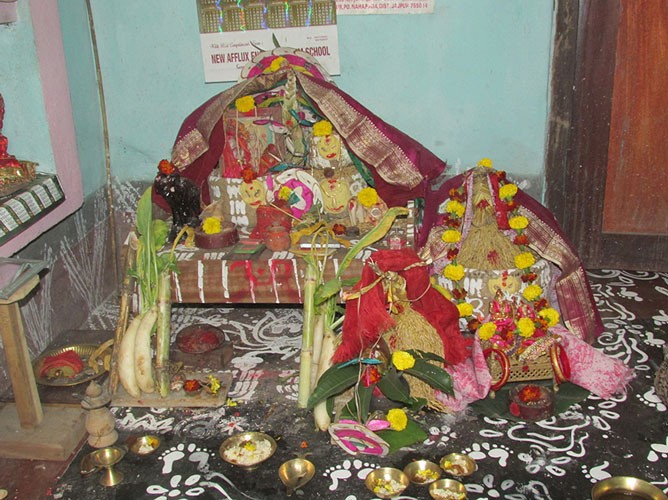“Manabasa Gurubar” – A Traditional Odisha Festival about women Empowerment
“Manabasa Gurubar” is one of the major vows observed in North Coastal districts of Andhra Pradesh as “Margashira Lakshmi Puja” and in Odisha. Thought the procedure is similar to that of the “Varlakshmi Pooja” and “Deepavali Lakshmi Pooja” the observance and the story is different. This pooja is observed on all Thursdays of the month. And different Prashad’s are offered like Manda Pitha, Khiri, Kakara, Chitau etc. are prepared and distributed to neighbours. On this day all Oriya women read Lakshmi Puran.

It is the worship of Goddess Maa Lakshmi on Thursdays in the month of Margasira or called as Magusura Masa. They wake up very early in the morning and clean the house with broom-sticks, for it is believed that goddess Lakshmi would never visit the house if the house is dirty and untidy. The entrances as well as the door step of the house are plastered with either cow-dung paste or red soil and the house is decorated with artistic Odias Alpana (called Chita). A pot made of bamboo canes (called adda diba) used in the olden days for measuring paddy (known as Mana) is filled up to the brink with freshly harvested paddy.
Beautiful sketches are drawn on it to welcome the Goddess. This is called ‘Jhoti’ in Odiya and ‘alpana’ in Hindi. Popular contents of ‘Jhoti’ include ‘Laxmi-Paada’, the footprint of Goddess Laxmi, Lotus, Her favorite flower and other figures. Western Odisha people used to call it as ‘Margasira Gurubar’ or more clearly, ‘Magsir Gurbar’ or “magusura gurubara”.
Women folk on this day observe a vrath called “Margashira Lakshmi Vara Vratham.This vrath is also called as “MANABASA GURUBAR VRATA”. In Odisha, it is believed that Goddess Laxmi, the Hindu goddess of wealth and prosperity, visit homes in Margasira month to every home who called her with heart.

Rituals
Wash the floor and decorate it with jhoti /chitta painting of rice paste.
On a low table (khatuli pedi), spread some newly harvested paddy grains of white colour.
Fill mana (a measuring pot made of cane called diba/boda/adda (made up Bamboo) ) with such grains and place it on the low table.
Wash three betel nuts in turmeric water and place them on the mana dhana.
Decorate the place with vegetables, flowers and coloured cloth.
Then invoke Mahalakshmi with lamp and incense and offer three offerings of meals in puja.”
Read out the Mahalakshmi Purana written by ancient poet Balaram Das while performing the puja. And also the Laksmi Puran
This Pooja is observed on all Thursdays of the Margasira Month

Story
The Legend of “Manabasa Gurubar” is based on the ancient scripture “Lakshmi Puran”. In ancient times untouchables were not allowed to pray, worship and do rituals to God . At that time Sriya a woman from untouchables dares to pray and worship and wins over the support of Goddess Lakshmi. But the real story begins when Lakshmi got separated by Lord Jagannath at the behest of his brother Balabhadra. Because she ends discrimination on earth by encouraging even untouchables to conduct rituals and worship. As Lakshmi moves out of Jagannath’s house, both Jagannath and Balram undergo immense suffering so much even they have to starve without water and food.
The curse of Lakshmi had a severe impact on both the brothers for 12 years and they had a tough time. Soon they realised the importance of Lakshmi and were keen to bring her back to their home. Lakshmi returned to Jagannath’s house on one condition that there will be no discrimination of caste and creed on earth. This unique story highlights the fact that for God everyone was equal. Besides it reflected the reforms and progressive stance of Gods from the ancient times. Only in the end through Narad it is revealed that Jagannath to end cast-ism and discrimination from this earth. He had himself “set up” these series of events which highlighted the social message besides the strength of true spirituality. The story not only draws an attention towards Castism but also gives an inspiration towards Women Empowerment.
=====
Must Read: Significance of Moksha Ekadashi & Gita Jayanthi
Must Read : Divine Mysteries : The Ever Mysterious Chidambara Rahasyam









